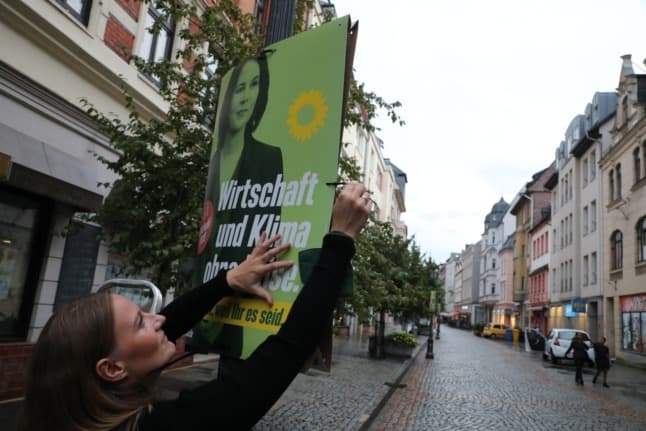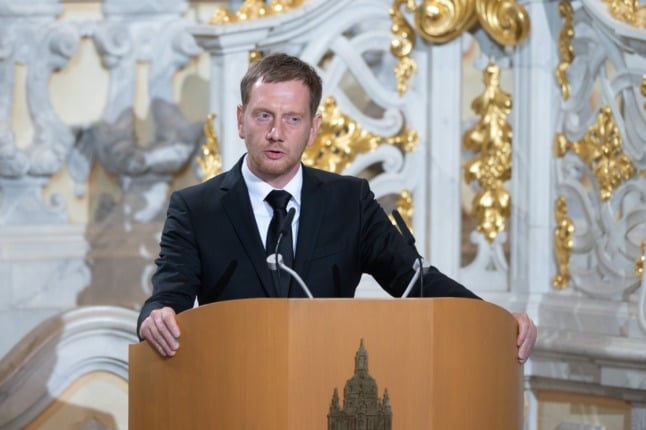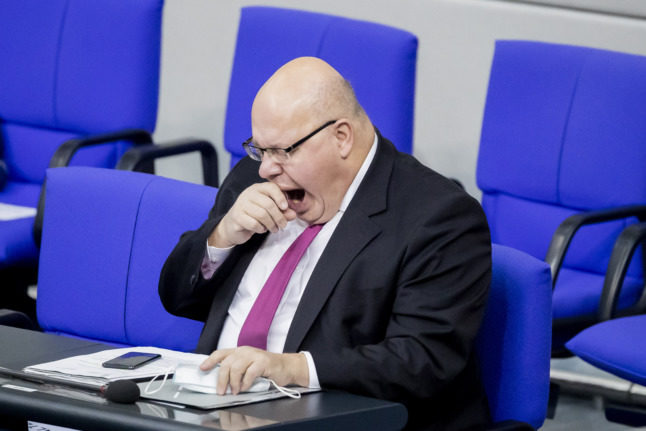German election roundup: 'Hang the greens' poster ban and politicians are white, male and 'Michael'

From a court finally banning controversial 'hang the Greens posters' to the most common name of election candidates standing in Germany, here is your politics roundup for Wednesday.
German court finally bans 'hang the Greens' campaign
A court in Germany ordered neo-Nazi election posters bearing the slogan "hang the Greens" to be taken down, after they were initially allowed to stay in place, reported AFP.
The upper administrative court in Bautzen, Saxony, on Tuesday overturned a provisional ruling, which permitted the posters from the radical far-right group "The Third Way" (Der III. Weg) to be displayed away from Green party election materials.
The Third Way has incited controversy with divisive public campaigns in the run up to national elections in Germany on September 26th.
On Saturday, the group displayed blood-smeared dummies representing the three candidates to be chancellor from the mainstream parties, the conservatives' Armin Laschet, Olaf Scholz of the Social Democrats and Annalena Baerbock of the Greens, in the Bavarian city of Würzburg.
Local officials in the city of Zwickau had ordered the removal of the radicals' election posters before their decision was overturned by a district court.
But an upper court has now rejected the lower court's decision.
The posters were an incitement to hatred, the ruling said, and "disturbed public peace with an attack on the human dignity of Green party members."
Initial arguments that the removal constituted an undue limitation on freedom of expression were dismissed by the court, which said this concern came behind "the defence of public safety" in this case.
A 2020 report from the German domestic intelligence service described The Third Way as a "meeting place for individuals in the neo-Nazi scene."
The Greens have been regular targets for far-right activists who accuse them of wanting to implement widespread bans, including on combustion engines under the banner of the fight against climate change.
READ ALSO: German court overturns ban on 'hang the Greens' posters
German politicians are very white, male... and Michael
With the election coming up, it's a good time to take a closer look at the type of people who want to represent you in Germany.
The job site Indeed sorted candidates standing for the Bundestag election by age, occupation and first name. And here's what they found:
Of the 6,211 candidates, 2,024 are women, reported Spiegel.
The candidates for the upcoming election are not only dominated by white men but also those with this first name: Michael (125 candidates). The next most popular name is Thomas (120), followed by Andreas (99), Christian (92) and Stefan (77).
On average, they are around 50-years-old.
The first names of foreign origin are found in 342nd place - three Mohamads and Erkans each made the list, as did three Deryas. A total of 24 women's names are found in the first 100 spots, with Susanne and Sabine being the most common with 33 candidates each.
Other names such as Yasemin, Zoe or Slaviša appear only once each.
Among men, there are lots of lawyers, other white-collar employees and entrepreneurs.
READ ALSO: More men named 'Hans' than women in top German government roles
For women, white-collar occupations, teachers and lawyers top the list. There are 30 nurses, and 17 stay-at-home mums who want to become members of parliament.

White, male and Michael... Could Saxony state premier Michael Kretschmer (CDU) be the archetypal German politician? Photo: picture alliance/dpa/dpa-Zentralbild | Sebastian Kahnert
In terms of numbers, students are far more strongly represented than all other professions: 386 are standing for election, which is more than six percent of all candidates.
The highest number of students, with 55 each, are active with the Greens and the satirical party Die Partei. They are followed by Volt (47 students), the Left (36) and the FDP (26). Both the CDU and the SPD are sending 14 students each into the race for parliament.
But the other side of the age spectrum is also well represented: 153 pensioners are running for the Bundestag.
Germans can't wait for election to be over
Meanwhile, the majority of Germans are glad that the election campaign will end soon.
A few days before the vote, the vast majority of Germans - 89 percent - are "glad that the campaign period is now coming to an end".
That's according to a Civey survey of 2,502 respondents commissioned by Die Zeit.
It came as Federal Election Commissioner Georg Thiel called for people to vote.
A high voter turnout is essential for the democratic legitimacy of the new German Bundestag, he told the "Rheinische Post."

Germans are getting tired of all this election malarky. Photo: picture alliance/dpa | Christoph Soeder
"I therefore call on all eligible voters to stand up for our democracy and cast their vote in this year's Bundestag election."
He added that this was also the most important opportunity to "influence how Germany develops in the coming years". Around 60.4 million citizens are eligible to vote; in 2017, the voter turnout was 76.2 percent.
Knives out over a possible left-leaning coalition
A high profile industry leader has spoken out over his fears of a possible future red-red-green government - a coalition made up of the Social Democrats, Greens and the Left party.
In this constellation, there is a danger that hundreds of thousands of jobs would be cut and industry would move away from Germany, said the president of the Employers' Association Gesamtmetall, Stefan Wolf, in an interview with Handelsblatt.
"It's about a directional election and the question of whether we get a government that stands up for the social market economy, entrepreneurship, for reforms, prosperity and jobs - or a government that wants more regulation and higher taxes," said Wolf, who is also CEO of automotive supplier Elring-Klinger. He said he feared that business conditions would deteriorate further after the election - and said, "Red-red-green would be poison."
There are many possible coalitions that could form after the election on Sunday and all depend on what happens on the day. However, there's been a lot of speculation in recent days of a coalition of SPD, Greens and The Left or SPD, the Greens and the pro-business Free Democrats (FDP).
READ ALSO: What red socks have to do with the German election
Comments
See Also
German court finally bans 'hang the Greens' campaign
A court in Germany ordered neo-Nazi election posters bearing the slogan "hang the Greens" to be taken down, after they were initially allowed to stay in place, reported AFP.
The upper administrative court in Bautzen, Saxony, on Tuesday overturned a provisional ruling, which permitted the posters from the radical far-right group "The Third Way" (Der III. Weg) to be displayed away from Green party election materials.
The Third Way has incited controversy with divisive public campaigns in the run up to national elections in Germany on September 26th.
On Saturday, the group displayed blood-smeared dummies representing the three candidates to be chancellor from the mainstream parties, the conservatives' Armin Laschet, Olaf Scholz of the Social Democrats and Annalena Baerbock of the Greens, in the Bavarian city of Würzburg.
Local officials in the city of Zwickau had ordered the removal of the radicals' election posters before their decision was overturned by a district court.
But an upper court has now rejected the lower court's decision.
The posters were an incitement to hatred, the ruling said, and "disturbed public peace with an attack on the human dignity of Green party members."
Initial arguments that the removal constituted an undue limitation on freedom of expression were dismissed by the court, which said this concern came behind "the defence of public safety" in this case.
A 2020 report from the German domestic intelligence service described The Third Way as a "meeting place for individuals in the neo-Nazi scene."
The Greens have been regular targets for far-right activists who accuse them of wanting to implement widespread bans, including on combustion engines under the banner of the fight against climate change.
READ ALSO: German court overturns ban on 'hang the Greens' posters
German politicians are very white, male... and Michael
With the election coming up, it's a good time to take a closer look at the type of people who want to represent you in Germany.
The job site Indeed sorted candidates standing for the Bundestag election by age, occupation and first name. And here's what they found:
Of the 6,211 candidates, 2,024 are women, reported Spiegel.
The candidates for the upcoming election are not only dominated by white men but also those with this first name: Michael (125 candidates). The next most popular name is Thomas (120), followed by Andreas (99), Christian (92) and Stefan (77).
On average, they are around 50-years-old.
The first names of foreign origin are found in 342nd place - three Mohamads and Erkans each made the list, as did three Deryas. A total of 24 women's names are found in the first 100 spots, with Susanne and Sabine being the most common with 33 candidates each.
Other names such as Yasemin, Zoe or Slaviša appear only once each.
Among men, there are lots of lawyers, other white-collar employees and entrepreneurs.
READ ALSO: More men named 'Hans' than women in top German government roles
For women, white-collar occupations, teachers and lawyers top the list. There are 30 nurses, and 17 stay-at-home mums who want to become members of parliament.

White, male and Michael... Could Saxony state premier Michael Kretschmer (CDU) be the archetypal German politician? Photo: picture alliance/dpa/dpa-Zentralbild | Sebastian Kahnert
In terms of numbers, students are far more strongly represented than all other professions: 386 are standing for election, which is more than six percent of all candidates.
The highest number of students, with 55 each, are active with the Greens and the satirical party Die Partei. They are followed by Volt (47 students), the Left (36) and the FDP (26). Both the CDU and the SPD are sending 14 students each into the race for parliament.
But the other side of the age spectrum is also well represented: 153 pensioners are running for the Bundestag.
Germans can't wait for election to be over
Meanwhile, the majority of Germans are glad that the election campaign will end soon.
A few days before the vote, the vast majority of Germans - 89 percent - are "glad that the campaign period is now coming to an end".
That's according to a Civey survey of 2,502 respondents commissioned by Die Zeit.
It came as Federal Election Commissioner Georg Thiel called for people to vote.
A high voter turnout is essential for the democratic legitimacy of the new German Bundestag, he told the "Rheinische Post."

Germans are getting tired of all this election malarky. Photo: picture alliance/dpa | Christoph Soeder
"I therefore call on all eligible voters to stand up for our democracy and cast their vote in this year's Bundestag election."
He added that this was also the most important opportunity to "influence how Germany develops in the coming years". Around 60.4 million citizens are eligible to vote; in 2017, the voter turnout was 76.2 percent.
Knives out over a possible left-leaning coalition
A high profile industry leader has spoken out over his fears of a possible future red-red-green government - a coalition made up of the Social Democrats, Greens and the Left party.
In this constellation, there is a danger that hundreds of thousands of jobs would be cut and industry would move away from Germany, said the president of the Employers' Association Gesamtmetall, Stefan Wolf, in an interview with Handelsblatt.
"It's about a directional election and the question of whether we get a government that stands up for the social market economy, entrepreneurship, for reforms, prosperity and jobs - or a government that wants more regulation and higher taxes," said Wolf, who is also CEO of automotive supplier Elring-Klinger. He said he feared that business conditions would deteriorate further after the election - and said, "Red-red-green would be poison."
There are many possible coalitions that could form after the election on Sunday and all depend on what happens on the day. However, there's been a lot of speculation in recent days of a coalition of SPD, Greens and The Left or SPD, the Greens and the pro-business Free Democrats (FDP).
READ ALSO: What red socks have to do with the German election
Join the conversation in our comments section below. Share your own views and experience and if you have a question or suggestion for our journalists then email us at [email protected].
Please keep comments civil, constructive and on topic – and make sure to read our terms of use before getting involved.
Please log in here to leave a comment.